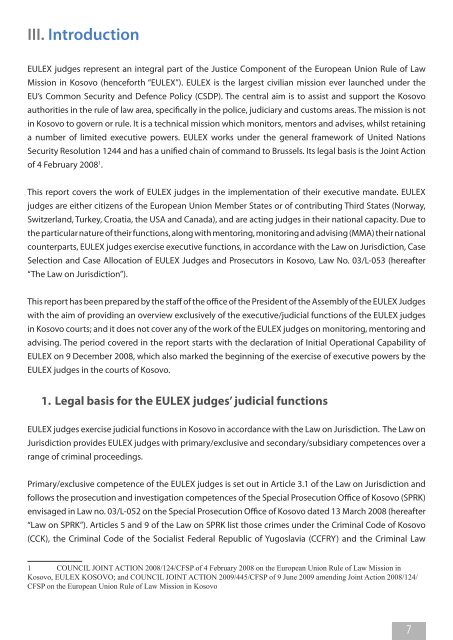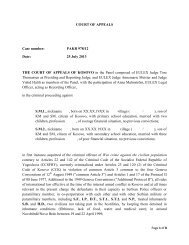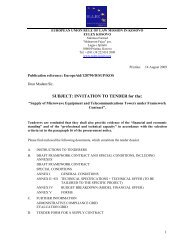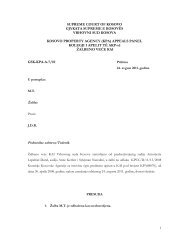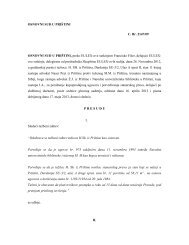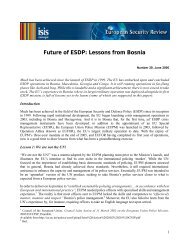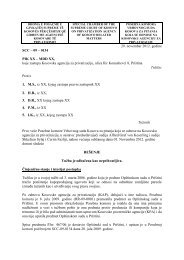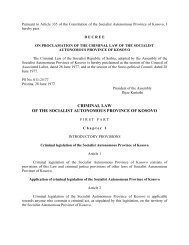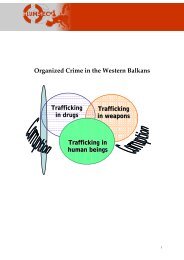English - Eulex
English - Eulex
English - Eulex
You also want an ePaper? Increase the reach of your titles
YUMPU automatically turns print PDFs into web optimized ePapers that Google loves.
III. Introduction<br />
EULEX judges represent an integral part of the Justice Component of the European Union Rule of Law<br />
Mission in Kosovo (henceforth “EULEX”). EULEX is the largest civilian mission ever launched under the<br />
EU’s Common Security and Defence Policy (CSDP). The central aim is to assist and support the Kosovo<br />
authorities in the rule of law area, specifically in the police, judiciary and customs areas. The mission is not<br />
in Kosovo to govern or rule. It is a technical mission which monitors, mentors and advises, whilst retaining<br />
a number of limited executive powers. EULEX works under the general framework of United Nations<br />
Security Resolution 1244 and has a unified chain of command to Brussels. Its legal basis is the Joint Action<br />
of 4 February 2008 1 .<br />
This report covers the work of EULEX judges in the implementation of their executive mandate. EULEX<br />
judges are either citizens of the European Union Member States or of contributing Third States (Norway,<br />
Switzerland, Turkey, Croatia, the USA and Canada), and are acting judges in their national capacity. Due to<br />
the particular nature of their functions, along with mentoring, monitoring and advising (MMA) their national<br />
counterparts, EULEX judges exercise executive functions, in accordance with the Law on Jurisdiction, Case<br />
Selection and Case Allocation of EULEX Judges and Prosecutors in Kosovo, Law No. 03/L-053 (hereafter<br />
“The Law on Jurisdiction”).<br />
This report has been prepared by the staff of the office of the President of the Assembly of the EULEX Judges<br />
with the aim of providing an overview exclusively of the executive/judicial functions of the EULEX judges<br />
in Kosovo courts; and it does not cover any of the work of the EULEX judges on monitoring, mentoring and<br />
advising. The period covered in the report starts with the declaration of Initial Operational Capability of<br />
EULEX on 9 December 2008, which also marked the beginning of the exercise of executive powers by the<br />
EULEX judges in the courts of Kosovo.<br />
1.<br />
Legal basis for the EULEX judges’ judicial functions<br />
EULEX judges exercise judicial functions in Kosovo in accordance with the Law on Jurisdiction. The Law on<br />
Jurisdiction provides EULEX judges with primary/exclusive and secondary/subsidiary competences over a<br />
range of criminal proceedings.<br />
Primary/exclusive competence of the EULEX judges is set out in Article 3.1 of the Law on Jurisdiction and<br />
follows the prosecution and investigation competences of the Special Prosecution Office of Kosovo (SPRK)<br />
envisaged in Law no. 03/L-052 on the Special Prosecution Office of Kosovo dated 13 March 2008 (hereafter<br />
“Law on SPRK”). Articles 5 and 9 of the Law on SPRK list those crimes under the Criminal Code of Kosovo<br />
(CCK), the Criminal Code of the Socialist Federal Republic of Yugoslavia (CCFRY) and the Criminal Law<br />
1 COUNCIL JOINT ACTION 2008/124/CFSP of 4 February 2008 on the European Union Rule of Law Mission in<br />
Kosovo, EULEX KOSOVO; and COUNCIL JOINT ACTION 2009/445/CFSP of 9 June 2009 amending Joint Action 2008/124/<br />
CFSP on the European Union Rule of Law Mission in Kosovo<br />
7


